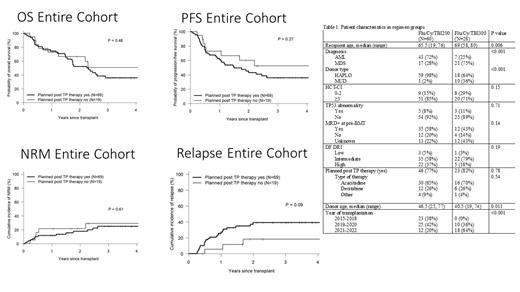Disease relapse remains a major cause of mortality for patients with AML and MDS undergoing allogeneic hematopoietic stem cell transplant (HSCT). Several trials have evaluated the use of hypomethylating agents (HMA) like azacitadine or decitabine as post-transplant maintenance with its use not currently recommended. Here we review our experience with AML and MDS patients undergoing non-myeloablative (NMA) peripheral blood stem cell transplant using post-transplant cyclophosphamide (PTCy) as GVHD prophylaxis and in whom post-transplant maintenance was used.
We retrospectively reviewed AML and MDS patients who had a NMA HSCT from January 2015 until December 2022. All patients received fludarabine, cyclophosphamide and TBI200 or TBI300 as conditioning regimen with tacrolimus, mycophenolate mofetil and PTCy as GVHD prophylaxis (Table 1). Sixty patients received TBI200 and 28 patients received TBI300. Median age at transplant was 65.5 years in the TBI200 group vs 69 years in the TBI300 group. Haploidentical donors were used in 59 (98%) of patients in the TBI200 group and 18 (64%) of patients in the TBI300 group. Minimal residual disease (MRD) was present 35 (58%) of patients receiving TBI200 and 12 (43%) of patients receiving TBI300. Post-transplant therapy was given in 46 (77%) of patients in the TBI200 group and 23 (82%) in the TBI300 group. The majority of patients in both groups received azacitadine. The median cycles of HMAs was 4 (range 1-12).
We found no difference in OS, PFS, relapse, or NRM comparing Flu/Cy/TBI200 and Flu/Cy/TBI300 (not shown). We evaluated the use of post-transplant maintenance on survival endpoints and found no difference in endpoints. In addition, post-transplant maintenance had no effect on OS, PFS, relapse, NRM or grade II-IV aGVHD regardless of MRD status at time of transplant. While, this is a small retrospective series, it warrants further investigation into the use of post-transplant maintenance in the setting of NMA HSCT using PTCy. While the use of HMA's did not increase NRM, their efficacy and perhaps combination with other drugs needs to be more closely studied in NMA PTCy transplants to decrease relapse.
Disclosures
Solh:Bristol-Myers Squibb: Speakers Bureau.


